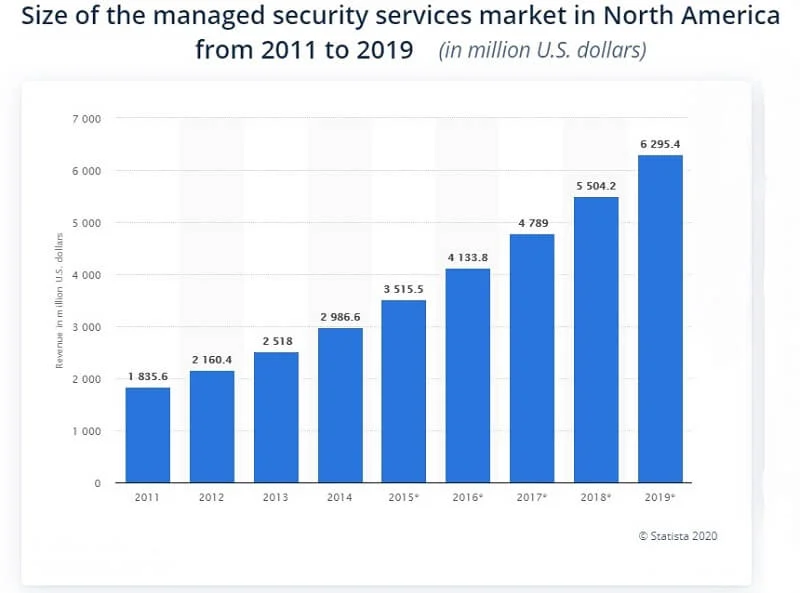- Solutions
- ShieldVision™
- By Use Case
- Industries
- SOC
- Visibility Triad
- Knowledge Center
- Partners
- Company
- Talk to an Expert
The use of managed services is growing as organizations struggle supervising multiple sophisticated software systems and advanced corporate networks. One specific area of company outsourcing is the implementation and management of cyber defenses to protect digital assets against ever-evolving security threats.
Managed Security Service Providers (MSSPs) address several business-critical issues organizations face when it comes to cybersecurity. A managed security service provider can assist in creating and deploying complex security infrastructure, managing platforms and tools, performing incident response, and providing continuous 24/7/365 monitoring.
The market for managed security services continues to grow due to an increased complexity of modern cyber security systems that requires adoption of well-thought security policies, incident response planning and recovery strategies. The managed security services market reports an impressive growth from $1.8 billion in 2011 to over $6 billion in 2019.

Source: Statista
Organizations hire third-party service providers to manage their cyber security operations due to lack of expertise and knowledgeable employees to handle a growing number of evolving cyber threats. Businesses must continuously protect against bad actors, but often only large enterprises can properly build and staff a security operations center enough to compete with MSSPs.
Often companies will make the mistake of only counting the cost of building a Security Operations Center (SOC) by the fees associated with constructing a facility and purchasing licenses for best-in-class software and solutions.
By only counting the physical needs, it discounts the cost of experienced, trained security professionals.
Good talent is hard to find...and keep. The SANS Institute’s 2019 SOC survey found that 57.7 percent of SOCs said the lack skilled staff.
Leading MSSPs will provide talented, experienced security engineers, analysts, and managers.
Managed Security Service Providers (MSSPs) offer Security-as-a-Service solutions to organizations and businesses of all kinds.
The rise of managed services began some two decades ago with Managed Service Providers (MSPs) who offered services to install and maintain business software solutions such as email services, cloud platforms and a variety of business software. MSPs focus on operations and primarily deal with the maintenance of business systems remotely or in-house.
MSSPs focus on security and generally do not provide additional services such as support and maintenance of business systems like Enterprise Resource Planning (ERP) software, Customer Relationship Management (CRM) systems, or network administration.
The primary role of a MSSP is to make sure an organization’s systems are safe and compliant with cyber security standards and best practices.
While managed service providers take care of updating and patching the software, a managed security provider performs these tasks at larger scale.
An MSSP can help a company’s security team make better security decisions by patching and updating all software systems, auditing an entire digital environment, and collecting vital operational data.
| Managed Security Service Provider (MSSP) | Managed Service Provider (MSP) | |
| Focus | IT Security | IT Administration |
| Objectives | Secures hardware, software and business systems | Ensures easy use of digital assets |
| Management | MSSP deal with all security threats. Implements measures for remediation, early detection and recovery | Manages essential systems and administration of networks |
| Security Measures | Protects against existing malware and analyzes new threats to provide proactive cyber defenses | Deals with updates and patches |
| Risk Mitigation | Analyzing current and possible vulnerabilities on a regular basis | Risk mitigation is limited to installing patches and updates |
| Security Level | Advanced to very advanced | Basic to medium |
Managed service providers focus on usability and performance, while MSSPs focus on all aspects of security.
An MSSP begins with an evaluation of a company’s digital assets and existing security tools. The security service provider then consults on gaps across the system and can suggest solutions, including implementation of hardware and security software. Only after security gaps are filled will an MSSP be able to provide reliable, continuous service to protect an organization from advanced and sophisticated cyber threats.
Top MSSPs will also proactively find and research the latest cyber threats and identify possible threats such as viruses, Trojans, ransomware and spear phishing email campaigns.
Once the initial evaluation by an MSSP is complete, a managed security provider may deploy, configure and manage several technologies such as:
Other services and solutions within a MSSP offering can cover areas such as deployment and management of virtual private networks (VPNs), firewalls, antivirus suites, anti-spam, web content filtering, and patch management.
Along with the deployment and management of security technologies MSSPs can offer a wide array of consulting services to draft and implement a thorough cyber security policy.
Each company requires unique data validation and tuning in order to run efficiently and reduce alert noise. Turnkey or one-size-fits-all solutions can do more harm than good for a company. It is of utmost importance to have a cyber-security strategy that is tailored to the needs of your organization.
Companies must make sure to hire MSSPs that have experience with companies of all sizes and industries.
Additionally, it is important for enterprises to use MSSPs that are tool-agnostic and can integrate data seamlessly across all technology solutions, requiring experienced security engineers.
A competent MSSP can help a company reach their strategic security goals, such as:
Some MSSPs specialize in a combination of specific security services while others offer the full range of services related to securing complete protection against cyber threats.
Leading organizations must have a proactive approach toward cyber security. Currently, only multinational and large corporations have shown to have adequate resources to implement resource efficient and cost competitive in-house security operations.
An organization whose primary business is not cyber security will always lack expertise, even if they can hire expert IT staff. Cyber threats are evolving rapidly, with each day bringing new viruses and malware and new firmware and software vulnerabilities.
Unless companies are prepared to make hefty investments in hardware, software and expert cybersecurity analysts, they should outsource business critical tasks to an MSSP that can:
Unlike MSPs which usually operate at local or regional level, MSSPs have global operations which allow them to see the big picture of evolving threats and vulnerabilities your systems may have.
Globally, the average cost of a data breach is $3.92 million and takes an average of 279 days to detect and contain a data breach, according to an IBM/Ponemon report. In the United States alone it costs $8.9 million on average for a data breach and 245 days to detect, on average.
These are frightening figures even for a multinational corporation, not to mention small to medium sized enterprises.
These figures suggest organizations can cope with today’s cyber threats by choosing between two options: building a strong in-house security team that will likely cost in the millions or outsource your security operations to a leading MSSP equipped with multiple security engineers, analysts, and developers for much less.
Lumifi has been a leading managed security services provider for over a decade. But we don’t let our experience stand alone, we also hire and retain top talent in order to stay ahead of the curve. Our security engineers and analysts are monitoring our clients’ networks 24/7/365 from our US-based SOC 2 Type II facility. Our engagement team provides unparalleled high-touch service and our product management team ensures we provide integrations with the world’s leading security technologies.
If you are looking to hire the best in managed security service providers contact us today.

Subscribe to Lumifi's Daily Cybersecurity News Curated by a CISO
We’ve expanded our MDR capabilities with enhanced incident response and security services to better protect against evolving cyber threats.